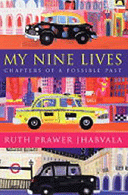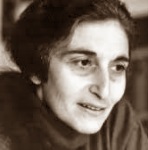My Nine Lives
Ruth Prawer Jhabvala
|
|
The fiction of the venerable Ruth Prawer Jhabvala, now in her late seventies, draws in varying degrees upon her interesting life story. Born in 1927 in Germany to Polish-Jewish parents, she was raised in England, having fled the Nazi regime. After marrying an Indian architect, she moved to Delhi in 1951, where she lived for more than 25 years. Jhabvala’s body of work is certainly informed by a Central European sensibility as well as by her English education, but India figures prominently, too. At once repulsive and seductive, it lures the young, restless and idealistic with its tradition of spirituality, disorienting, in the end, even the most seasoned and jaded foreigners. Jhabvala’s latest work of fiction, My Nine Lives — though publicized as a novel, it could easily be read as a series of nine thematically related stories, or “chapters,” as the writer calls them — is the most autobiographical of her works. Or, rather, “potentially autobiographical,” as she explains somewhat elusively in the book’s apologia. “Even when something didn’t actually happen to me,” Jhabvala writes, “it might have done so. Every situation was one I could have been in myself, and sometimes, to some extent, was.” The tales are narrated by nine Western women, many of whom long for the exoticisms of India. Some of the stories are told retrospectively, and the best are related by a cool melancholy voice that cannot be trusted all the time. The narrators tend to be naive, restive, lonely, unattractive and burdened with the weight of responsibility, with having to deal with and support the people in their lives, either emotionally or financially. It is to India that they most often flee as a means of escape. “I could never recapture the complete ease, the freedom, the irresponsibility of my earlier Indian years,” says Rosemary, the protagonist of the beautiful and wistful “Life.” Only as an old woman, when she returns to Delhi for good, can she indulge again in the fecklessness of her youth, without responsibility and “with an even lighter heart.” Even in one of Jhabvala’s non-Indian chapters, “Springlake” — about a trio of useless bohemians who inhabit a decaying Hudson Valley estate — the burdens of everyday life seemingly prevent the protagonists from pursuing their ideals, no matter how childish these might be. Like the characters in Jhabvala’s previous fiction (such as her 1973 novel Travelers and her 1957 story collection Out of India), the women of My Nine Lives yearn for spiritual fulfillment, for the poets, saints, dancers and philosophers who come to stand for India itself. This allure turns out, in some cases, to be superficial, for it isn’t the real India that these women seek, but rather the mystical land of their imaginations that they hope will satisfy their insecurities and needs. In the chapter called “Gopis,” a young American girl named Lucia, not yet out of her teens and living in New York City, is so enamored of all things Indian that she falls for the much older and highly suspect Vijay, a man “bloated with drink and age . . . in whom she saw some sort of physical embodiment of India.” To Lucia, Vijay is a father figure, a guide, a guru — a character that appears throughout this book in various guises, as well as in Jhabvala’s earlier work, namely the 1983 novel In Search of Love and Beauty. These men may be artists (the pianist Yakuv in “Ménage” and the painter Kohl in “Refuge in London”), successful politicians (Muktesh in “A Choice of Heritage” and Vidia in “Dancer With a Broken Leg”) or intellectuals (the renowned Professor Hoch in “My Family”). The relationships between Jhabvala’s narrators and the older men in their lives can be overtly physical (raising issues concerning paternity and sexuality) or more ambiguous, as with the European artist Kohl, who sketches the teenage protagonist of “Refuge in London,” turning her into both object and muse, attracted as he is to “a particular evanescent stage of youth . . . girls in bloom, flowers in May.” In the dramatization of this guru-acolyte relationship, Jhabvala returns to one of her most enduring themes: the relationship between men and women. In almost all cases, the men in My Nine Lives possess considerable power; the women are all too happy to simply luxuriate in the presence of genius. So powerful is the allure of the pianist Yakuv, for example, whose fingers fly across the keyboard with a volatility that matches his temper, that he can dramatically alter the personalities of the three women around him just by sleeping with them. He himself changes not a bit. Because Jhabvala’s women tend to be powerless and in a perpetual state of physical or emotional exile, they spend most of their time longing for what they don’t have in their lives, mainly love. There’s a terrific scene at the end of “Life” in which the narrator, Rosemary — now a lonely old woman living in a Delhi brothel, her PhD dissertation on an Indian poet-saint still unfinished — describes her journeys to a remote spot on the outskirts of the city, where she sits among “a cluster of crumbling little pavilions” and tombs to read the work of her beloved poet-saint. Soon other old people begin to join her for the readings (the irony being that poetry readings are usually frequented by the young) and for the singing of songs that “sound like a cry of anguish — of desperate love for the Friend who will not come, not even now at the end of our lives of unrequited longing.” There’s something pathetic about these overgrown children singing and reciting verse, with the hardships of the real world somehow beyond them, but there’s something hopeful about it, too. Even among the tombs and decaying structures, a youthful sense of idealism can make a difficult life bearable, Jhabvala seems to be saying. It’s true of all the women in this “potentially autobiographical” book, and, one might assume, of the one woman whom they all resemble in some slight or serious way: Ruth Prawer Jhabvala herself. (Ruth Prawer Jhabvala died in 2013 at the age of 85) Reviews
|


 Ruth Prawer Jhabvala
Ruth Prawer Jhabvala